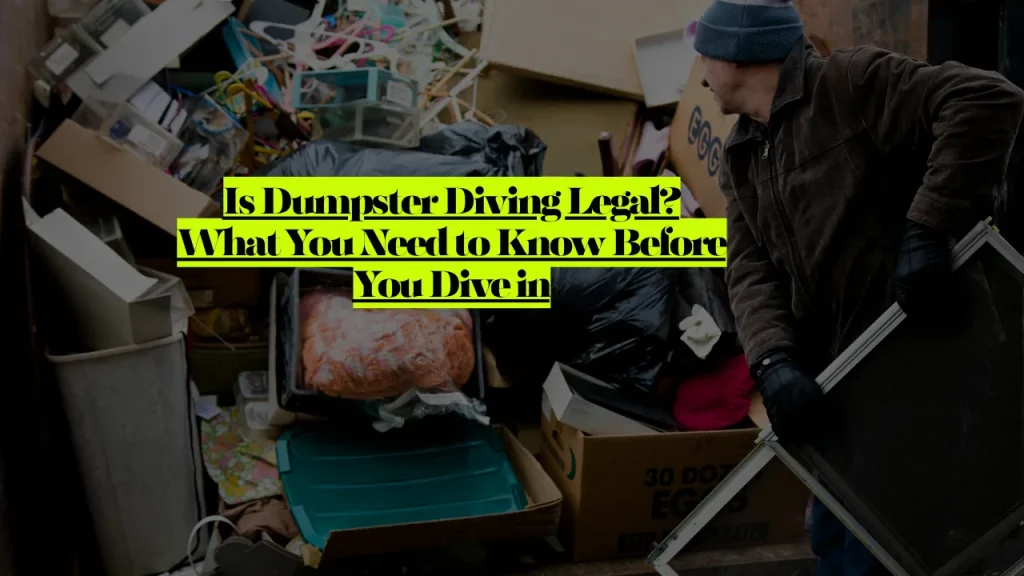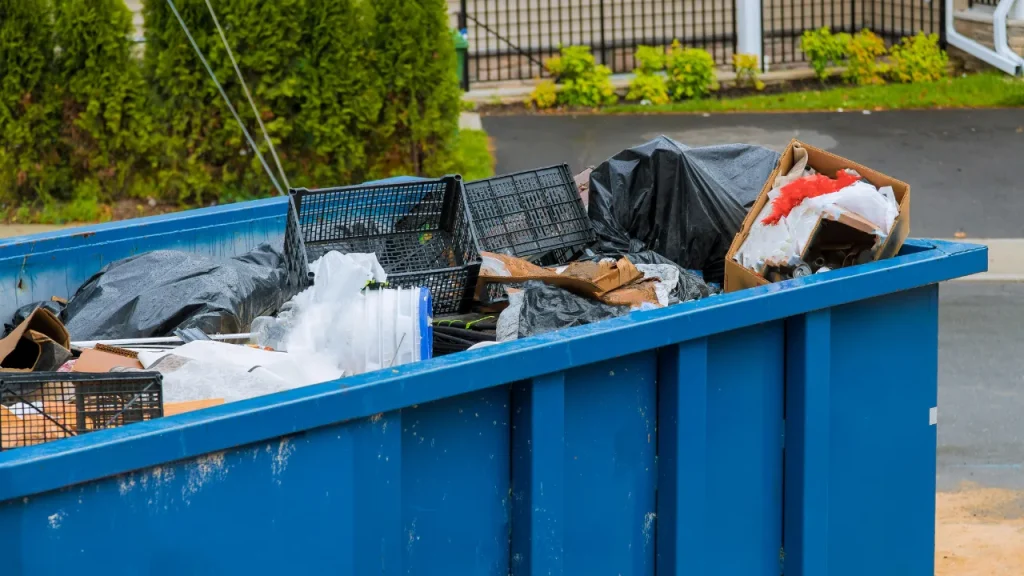Is Dumpster Diving Legal? What You Need to Know Before You Dive in
Finding free treasures in someone else’s trash sounds appealing—but is it legal? The answer isn’t as simple as yes or no. While dumpster diving is technically legal across all 50 states, the reality is far more complex, with local laws, property rights, and specific circumstances determining whether you’ll walk away with a great find or a criminal charge.
The Constitutional Foundation: California v. Greenwood
The 1988 Supreme Court case California v. Greenwood established that once trash is placed in a public area for collection, individuals have no reasonable expectation of privacy in their discarded items. The Court reasoned that garbage left at the curb is “readily accessible to animals, children, scavengers, snoops, and other members of the public”, making it public domain.
This landmark ruling created the legal framework that makes dumpster diving permissible at the federal level. However, this protection comes with critical limitations that every would-be diver must understand.
The Legal Gray Zone: When Dumpster Diving Becomes Illegal
Trespassing: The Primary Legal Risk
The most significant legal risk involves trespassing—entering private property without permission is illegal in all states. Most commercial dumpsters sit behind buildings, inside fenced areas, or on private property. In California, trespassing charges can range from a $1,000 fine to up to six months in county jail, sometimes with both penalties.
Warning signs matter legally. If there are “No Trespassing” signs, locks, chains, or fences around a dumpster, tampering with them or ignoring the restrictions can lead to criminal charges.
Theft and Property Ownership Issues
Texas courts have ruled that discarded items aren’t truly abandoned until collected by waste management, creating potential theft charges for dumpster divers. In a 2021 Texas case, a man faced theft charges for removing a television from an abandoned dumpster because courts determined it still belonged to the property owner until official collection.
Related article: Is Dumpster Diving Legal in Colorado? Your Complete Legal Guide

Disorderly Conduct and Other Violations
Disorderly conduct charges can result from complaints about noise, mess, or blocking sidewalks while diving, with penalties typically including fines around $500 and possible imprisonment. Law enforcement can ticket or arrest divers for littering if the area is left messy.
State-by-State Legal Variations
While dumpster diving is legal federally, local regulations create a patchwork of rules:
California
Generally legal under California v. Greenwood, though trespassing laws still apply and some cities have local bans. Los Angeles and other municipalities have specific restrictions.
Texas
Texas court rulings hold that items aren’t abandoned until waste management collects them, effectively making dumpster diving illegal.
New York
New York City makes it illegal to “disturb, remove, or transport by motor vehicle any amount of recyclable material” meant for Department of Sanitation collection. The city views scavengers as criminals stealing city property.
Michigan
Detroit requires a license for collecting trash from public areas, with violations bringing fines up to $500 and possible jail time. Warren prohibits unauthorized curbside collection without a junk peddler license, and Ann Arbor bans dumpster diving through local ordinance.
Florida
Legal in public spaces, though private property restrictions apply strictly.
Other States
States including Pennsylvania, Ohio, North Carolina, Virginia, Illinois, Missouri, Georgia, and Iowa generally allow dumpster diving unless prohibited by local ordinances.
Related article: What Is Dumpster Diving Identity Theft? Methods, Laws, and How to Protect Yourself
Recent Legal Developments and Trends
Growing Urban Restrictions
Denver has seen an increase in ordinances preventing dumpster diving in urban areas starting around 2020. A 2019 California case involved a Sacramento man arrested for trespassing and theft after taking discarded electronics from a Walgreens dumpster, sparking debate about items clearly discarded but still on private property.
Environmental and Sustainability Movement
Some cities are implementing food recovery initiatives that encourage diverting edible food from landfills, promoting collaboration between businesses and communities. Cities like Seattle support diving to reduce waste, while others in Austin might make diving legal in public spots to cut landfill use.
Property Rights vs. Urban Foraging: The Constitutional Debate
The intersection of property rights and waste management creates unique legal tensions. Critics argue the Greenwood decision fails to recognize reasonable privacy expectations in discarded items, forcing citizens to resort to expensive self-help measures like trash compactors or paper shredders.
The economic reality is stark: The EPA reports 140 million tons of trash go to U.S. landfills annually, much of which could be reused. Each year, millions of tons of usable goods end up in landfills, and salvaging items reduces environmental damage while lowering carbon footprints.

Legal Consequences You Should Know
Criminal Penalties
Trespassing: Misdemeanor charges with fines up to $1,500, up to 30 days in county jail, or up to 2 years probation in some states.
Theft: Charges depend on the value of items taken and state laws.
Disorderly Conduct: Usually charged as a misdemeanor with fines and possible imprisonment.
Civil Liability
Business owners can sue under trespassing tort law and may use reasonable force to defend waste on their property. If injured while diving, injury claims may be dismissed if trespassing, though property owners could face liability for failing to post adequate warnings.
How to Stay Legal While Dumpster Diving
Research Local Laws
Check local laws online, contact police non-emergency lines, or inquire directly with stores before diving. Many city websites publish municipal codes that address dumpster diving.
Focus on Public Property
Dumpsters on public property with no expectation of privacy are legally accessible once trash is on the curb. Avoid dumpsters behind buildings, inside fences, or with warning signs.
Seek Permission
Ask property owners for permission before diving behind businesses—many may allow access if approached respectfully.
Be Respectful and Courteous
Leave areas cleaner than you found them, don’t block sidewalks, and leave immediately if asked by property owners or employees. Potential divers should avoid littering, trespassing, and disturbing the peace.
Time Your Dives Carefully
While many prefer nighttime diving when temperatures are cooler and businesses discard items around closing time, diving at night can draw extra attention from law enforcement who may misconstrue intentions.
Frequently Asked Questions
Can I go to jail for dumpster diving?
Yes, you can face jail time for dumpster diving if you trespass on private property, ignore warning signs, or violate local ordinances. Penalties range from fines to county jail sentences depending on the jurisdiction and circumstances.
Is dumpster diving legal if the dumpster is locked?
No. Forcing entry into a locked dumpster is considered vandalism or theft, and tampering with locks, gates, or barriers is a misdemeanor offense in most states.
Can I take recyclables from curbside bins?
It depends on location. In New York City, taking recyclables is explicitly illegal and considered theft of city property. States including California, Maine, and Michigan have deposit laws that make cross-state bottle recycling schemes technically criminal.
What’s the difference between public and private property for dumpster diving?
Trash on public property (like curbside) is generally considered public domain under the Greenwood ruling. However, items in dumpsters on private property are still owned by the business or property owner until officially discarded.
Does the Good Samaritan Food Donation Act protect dumpster divers?
No. The Good Samaritan Food Donation Act protects food donors from liability, not dumpster divers. Store managers cannot legally prevent donation but may cite liability concerns about discarded food.
Are there any states where dumpster diving is completely illegal?
Texas courts have effectively made dumpster diving illegal through rulings that items remain property until waste management collection. However, no state has an outright statewide ban—legality depends on local ordinances and specific circumstances.
Can businesses press charges against dumpster divers?
Yes. Businesses can press trespassing or theft charges if divers are caught on private property. Many businesses post “No Dumpster Diving” signs to establish legal warnings against unauthorized access.
Expert Legal Perspective
Understanding dumpster diving law requires balancing constitutional privacy protections, property rights, and environmental sustainability. The Greenwood decision established that the Fourth Amendment doesn’t protect discarded trash in public spaces, but this federal protection doesn’t override local trespassing laws or municipal ordinances.
For consumers considering dumpster diving, the key is understanding that federal legality doesn’t equal universal permission. Property rights consistently trump trash rights in legal disputes.
The Bottom Line: Navigate Carefully
Dumpster diving exists in a complex legal landscape where federal permissibility meets local prohibition. While the Supreme Court has ruled dumpster diving legal in all 50 states when done on public property, the practical reality involves navigating trespassing laws, local ordinances, and property rights.
The safest approach combines thorough legal research, respect for property boundaries, and courteous behavior. When in doubt, seek permission or consult with a local attorney who understands your jurisdiction’s specific regulations.
Disclaimer: This article provides general legal information for educational purposes only and does not constitute legal advice. Dumpster diving laws vary significantly by jurisdiction, and this content should not be relied upon as a substitute for consultation with a qualified legal professional familiar with your local laws. Contact a criminal defense attorney if you face legal issues related to dumpster diving.
About the Author

Sarah Klein, JD, is a former civil litigation attorney with over a decade of experience in contract disputes, small claims, and neighbor conflicts. At All About Lawyer, she writes clear, practical guides to help people understand their civil legal rights and confidently handle everyday legal issues.
Read more about Sarah
